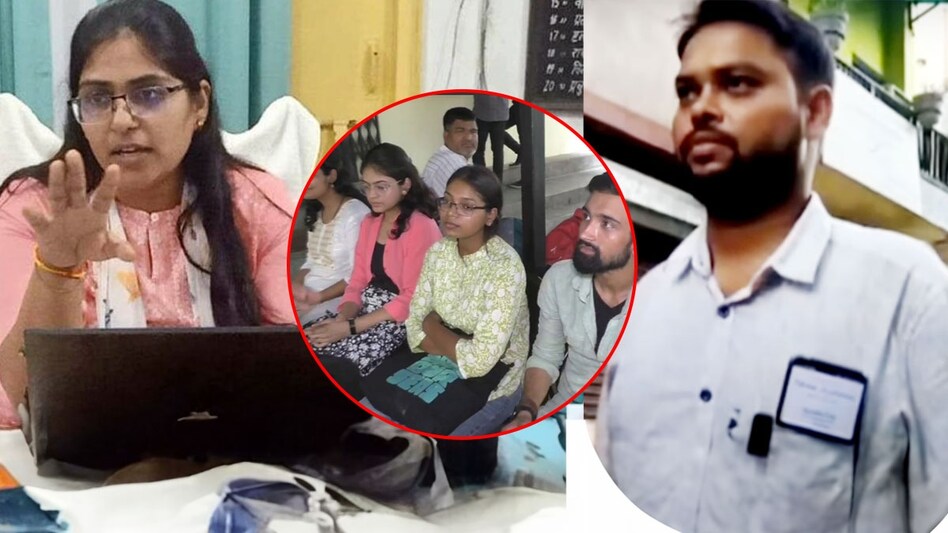
The Jyoti Maurya-Alok Maurya Case: A Deep Dive into Alimony, Allegations, and Legal Battles
The ongoing legal saga between Jyoti Maurya and Alok Maurya, a case that has captivated public attention, has taken a new turn with Alok’s petition for alimony from his estranged wife. This complex dispute, rife with accusations and counter-accusations, sheds light on the evolving landscape of marital laws in India.
The Genesis of a Relationship and a Dream
Jyoti Maurya and Alok Maurya, hailing from Varanasi, tied the knot in 2010. At the time, Alok was a fourth-grade employee within the Panchayat Raj Department in Pratapgarh. Jyoti, on the other hand, harbored ambitions of becoming a government officer and was actively pursuing her degree. Alok played a pivotal role in supporting her aspirations, even securing loans to finance her education and managing their household to allow her to focus entirely on her studies. Their collective efforts bore fruit in 2015 when Jyoti successfully cleared the Uttar Pradesh State Service Examination, achieving an impressive 16th rank and realizing her dream of becoming a government officer. She was subsequently appointed as a Sub-Divisional Magistrate. The same year also saw the couple welcome twin daughters into their lives.
The Unraveling: Accusations and Counter-Accusations
Initially, their life together appeared harmonious. However, cracks began to appear, leading to escalating disputes. In July 2023, the conflict spilled into the public domain when Alok sensationally accused Jyoti of engaging in an extramarital affair with another officer at her workplace. He further alleged that they had threatened and attempted to harm him. These accusations quickly went viral across social media platforms.
Jyoti swiftly retaliated with her own set of serious allegations. She accused Alok of fraud, claiming he had misrepresented his profession at the time of their marriage, stating he was a Gram Sevak officer when he was, in fact, a sanitation worker. Furthermore, she alleged that Alok’s family subjected her to dowry harassment and that their relationship deteriorated significantly after she secured her government job, leading to both physical and mental abuse due to his suspicions. Following this public fallout, their divorce proceedings commenced.
Alok’s Alimony Petition: A Legal Precedent
The latest development in this high-profile case is Alok’s petition for alimony from Jyoti, filed in the Allahabad High Court. He had previously sought interim alimony in the Azamgarh Family Court, citing his financial difficulties as a fourth-grade employee, his health issues, and Jyoti’s significantly higher income as a government officer. However, the Azamgarh Family Court rejected this petition on January 4, 2025.
Undeterred, Alok approached the Allahabad High Court on July 12, reiterating his request for financial assistance from Jyoti during their ongoing legal battle. He emphasized the stark difference in their salaries, with him being a sanitation worker and her a government officer. The Allahabad High Court has since responded to his petition and issued a notice to Jyoti regarding the matter.
Understanding Alimony for Husbands in India
This case brings to the forefront a crucial aspect of Indian marital law: the right of a husband to seek alimony from his wife. The video clarifies that, while historically alimony claims were predominantly made by wives, the Hindu Marriage Act of 1955 was amended to include provisions for husbands as well. Under Section 24 of the revised act, husbands now possess the legal right to seek alimony.
Alimony is determined based on specific financial criteria and conditions. Sections 24 and 25 of the Hindu Marriage Act, 1955, govern these provisions :
- Section 24: Pertains to interim maintenance during divorce proceedings, which is a temporary financial provision for a specified period.
- Section 25: Deals with permanent alimony, a long-term financial arrangement.
Conditions for a Husband to Receive Alimony:
- Income Disparity: The wife’s income must be demonstrably higher than the husband’s. In the Jyoti and Alok case, Jyoti, as a Class One officer, earns significantly more than Alok, a fourth-grade employee, which could weigh in Alok’s favor under this condition.
- Financial Dependence: The husband must prove financial dependence on his wife, and the court must be convinced that he would be unable to meet his basic needs post-divorce. This condition might pose a challenge for Alok, as he is a government employee with an income sufficient for his basic needs, even as a fourth-grade worker.
- Physical Disability/Serious Illness: Alimony can also be claimed if the husband is disabled or suffers from a serious illness. Alok has cited health issues in his petition, but he will need to provide sufficient proof to the court that his illness is severe enough to impair his earning capacity.
When adjudicating alimony, the court meticulously considers the financial status, income, and lifestyle of both parties . Typically, alimony is set at approximately 25% of the payer’s salary. The court also takes into account who is responsible for the children’s upbringing post-marriage. In this case, Jyoti is solely responsible for raising their twin daughters and covering their upbringing and educational expenses, a point she intends to use to strengthen her defense .
The Road Ahead
The Family Court had considered these various factors when it initially rejected Alok’s alimony petition. The next hearing for Alok’s petition in the Allahabad High Court is scheduled for August 8. The outcome of this high-profile case will undoubtedly set a significant precedent in Indian family law, as everyone awaits the court’s final decision on whether Alok will receive alimony from Jyoti .